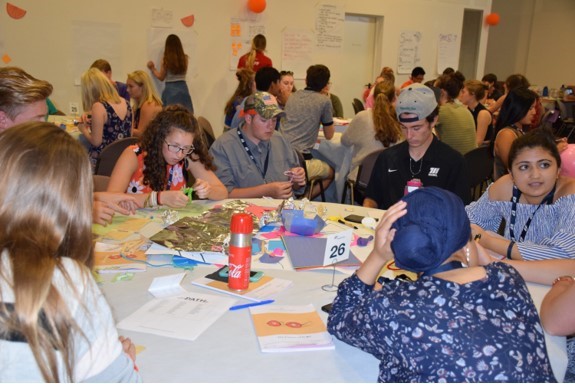This article is from one of EF’s Global Leadership Summit interns, Rachel, following her experience at our “Future of Food” Summit in Milan, Italy. The Summit Internship Program gives high school students a chance to deepen their experience at EF Summits by gaining valuable real-life skills through public speaking, journalism, social media, and photography.
On day 2 of the EF Global Leadership Summit, I attended a leadership workshop entitled “Creating Transformative Change by Involving Others in Your Passions.” At the session, each table of students in the room was asked to identify one issue that all members felt passionate about. We were instructed to build a bracelet out of materials that represented our issue. Afterwards, one representative from each table took a turn explaining why they thought their chosen topic was important and what their bracelet symbolized. Topics ranged from human trafficking to social injustices. While this was meant to be a competition, at the end of the workshop the winning table stood up and proclaimed that we had all won. All of our issues mattered and all of our voices should be heard. This moment perfectly captured everything that the Summit is about – teamwork, collaboration, and compassion.
“People let their guard down at the table.” This simple phrase stated by keynote speaker Anthony Bourdain held particularly true at the Summit. Our goal over the weekend was to identify various food-related issues such as food deserts, increasing food allergies, and obesity. Using these problems as inspiration, students used the Design Thinking methodology as we collaborated with each other to propose, design, and build a tangible prototype of our solution – all in only 6 hours. The process sounds idealistic and chaotic, and it is, but it works. “How?” you might ask. It works because all of us knew that the inevitable, scary, and uncomfortable process of change would demand an open mind and a pursuit of unity. Generation Z (my generation) is loosely defined as anyone born after the mid-1990s until now. While often thought of as uncommunicative and internet absorbed, at the summit it was quite the contrary. All members in my group of ten were very inclusive, and everyone’s ideas were heard and valued. Even when opposing opinions arose, we always found a resolution. We let our guard down and opened ourselves to new possibilities.
Global Citizenship is the realization that we as people have a responsibility to those that are part of our local and international communities, and that our actions within those communities have a purpose and lasting impact. While on tour of Italy with my fellow global citizens I had the honor of getting to know some of the most intelligent, motivated, and veritable human beings on Earth. All twenty of us sat together conversing about food, but also about climate change, philosophy, politics, and education. Our energy and knowledge fed off of each other. We were unapologetically ourselves. It was infectious, but the real joy came from learning to trust one another. We trusted each other with our real opinions, disagreements, goals, and hardships. If we were going to accomplish anything we had to. There were several late nights in our little Italian hotel rooms where my roommates and I confided in each other and laughed late into the night. We walked into the lobby of our Boston hotel before our trip as complete strangers, but we left as real friends.
During the press conference in Milan, I asked Dr. Raj Patel what he believed posed the greatest threat, either present or future, to food and what he believed Generation Z could do in terms of combating that threat. Dr. Patel answered that it was, and still is, climate change. More specifically, “We are clinging to the same kinds of systems, the kinds of industrial agricultural production that militate against actually making substantive change. So, it’s not just that the weather is changing, it’s that we’re also actively hanging on to systems that are making it far, far worse. Climate change is never just the weather. It’s always about the effects of the weather on social systems and how they are propagated elsewhere.” This paints a bleak picture for all of us, but from participating in the Summit we learned from Dr. Patel that the most dangerous, immobilizing thought is, “I’m just one person. What can I do?” At the summit, nobody was just one person. I wasn’t just one person. Little would have been accomplished had our ideas not collided in such a dynamic and open environment. Even though we are all back home, we still aren’t alone. We learned that organizing and relying on each other is crucial to propitious change and global citizenship. Even in a time of particularly high international unrest and tension, Generation Z brought acceptance and respect, regardless of classifications or divisions. We truly embodied the African Proverb that states, “If you want to go fast, go alone. If you want to go far, go together.”
Related articles

